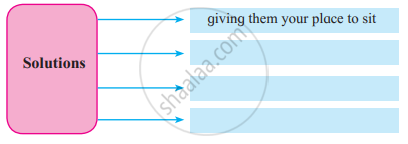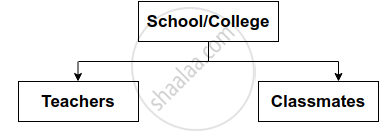Advertisements
Advertisements
Question
Write an appreciation of the poem ‘Father Returning Home’.
Solution
Appreciation of the poem
‘Father Returning Home’
‘Father Returning Home’ by Dilip Chitre is a biographical sketch of the poet’s father. It is a monologue that deals with the plight of man, where he alienated from the very society that he built. He, thus, goes through the mundane motions of life, having no connections with either the outside world or even his family and suppresses his emotions as there is no one with whom he can share them.
The poem deals with the themes of alienation or estrangement, isolation, and the dissolution of the self in the man-made world.
This two-stanza poem, which has been written in the form of a dramatic monologue, does not follow any rhyme scheme as it is written in free-verse. The lines in the poem clearly depict the miserable state of man in this busy and crowded world.
The poet uses numerous figures of speech such as Alliteration, Consonance, Metaphor, Onomatopoeia, Paradox, Personification, Repetition, Simile and Transferred Epithet. An example of Paradox from the poem is “unseeing eyes”, as the phrase is self-contradictory.
The language used by the poet is very simple and straight-forward. It paints a vivid picture of the tiring routine of the poet’s father and communicates his pathetic condition through the use of various descriptive words.
The use of enjambment, where one line of the poem continues into the next, indicates the succession of the worsening state of the father’s condition, whether it’s his isolation from the outside world in the first stanza or his alienation in his own house in the second stanza. The use of imagery is clearly evident in the poem. Whether the poet is sketching the image of his father as an old man with words like “eyes dimmed by age”, “fade homeward”, “grey platform”, or describing his father’s appearance “soggy shirt and pants”, “black raincoat stained with mud”, “chappals sticky with mud”, or comparing the disembarking of his father from the crowded train as “a word dropped from a long sentence”, the strong use of imagery makes the poem thoroughly appealing.
The message that the poem conveys is that of the seclusion of man from the modern world. In today’s fast-paced and humdrum life, the only solace that man can find is in his dreams of the past or the future. The poem also communicates the apathy of the society towards the elderly, who are trying to cope with estrangement in a metropolis.
Overall, I find the poem highly relevant to today’s world. The aspect that I like the most about the poem is the simplicity with which it conveys a strong message to the readers.
APPEARS IN
RELATED QUESTIONS
Discuss with your partner the difficulties that you face while commuting to and from the college by public transport.
(a) ____________________
(b) ____________________
(c) ____________________
(d) ____________________
The similar problems are faced by the other commuters on the way to their work place. Imagine their plight and suggest three solutions.

Complete the following table.
| A | B |
| The way our elders take care of us | The way you can take care of elders in your family. |
| 1. Love and protect us | 1. Help them with daily chores |
| 2. ____________ | 2. ____________ |
| 3. ____________ | 3. ____________ |
Write your duties towards the following:


Discuss with your friend the difficulties faced by the father in the poem.
(a) ______________________
(b) _____________________
(c) ______________________
(d) _____________________
Discuss the character sketch of the father with the help of the given points.
(His pathetic condition, the treatment he receives at home, his solitude, the way he tries to overcome it)
Given below are the ideas conveyed through the poem. Match the pairs and draw out the hidden meaning from those expressions.
| Expression | Meaning |
| a. Children avoid expressing themselves. | 1. Father is so eager to meet family members that he even doesn’t bother about his safety |
| b. Father was deprived of refreshing hot beverages or a nourishing diet. | 2. Hostility of children |
| c. The father hurries home crossing the railway line | 3. Indulge in his past and future. |
| d. The father was destined to listen only to the cracking sounds on media. | 4. Uncomfortable journey |
| e. His sordid present is devoid of any hope. | 5. His basic daily requirements were also not catered to. |
| f. The father’s endless commuting distance him from his children | 6. Father is not less than any tribal wanderer, a modern nomad. |
| g. Suburban area, visible through the train, is past unnoticed. | 7. Has the least value in the society where his presence or absence might hardly make any difference. |
| h. He is just as a small word, dropping from a sentence. | 8. Because there is hardly anything enchanting/interesting in the monotonous routine journey to look out of the window |
| i. He doesn’t get a place in a crowded train. | 9. The father couldn’t even fulfill the least expectation of entertaining himself. |
Find the line to prove the following fact from the poem.
Father is deprived of good food.
Find the line to prove the following fact from the poem.
Children did not have a healthy relation with the father.
The poet deals with the theme of man’s estrangement from a manmade world. Analyze it with the help of poem.
The father contemplates about his past and peeps into his future. Give reasons.
Compose a short poem in about 4-6 lines on your father.
Dilip Chitre has translated Sant Tukaram’s ‘Abhang’ (devotional poem) for which he received Sahitya Akademi Award. Browse the internet to collect more information about it.
List various occupations related to services which can be rendered to senior citizens.
- To counsel patients of Alzheimer’s disease.
- _______________________
- _______________________
Appreciation:
My father travels on the late evening train
Standing among silent commuters in the yellow light
Suburbs slide past his unseeing eyes
His shirt and pants are soggy and his black raincoat
Stained with mud and his bag stuffed with books
Is falling apart. His eyes dimmed by age
fade homeward through the humid monsoon night.
Now I can see him getting off the train
Like a word dropped from a long sentence.
He hurries across the length of the grey platform,
Crosses the railway line, enters the lane,
His chappals are sticky with mud, but he hurries onward.
Home again, I see him drinking weak tea,
Eating a stale chapati, reading a book.
He goes into the toilet to contemplate
Man's estrangement from a man-made world.
Coming out he trembles at the sink,
The cold water running over his brown hands,
A few droplets cling to the greying hairs on his wrists.
His sullen children have often refused to share
Jokes and secrets with him. He will now go to sleep
Listening to the static on the radio, dreaming
Of his ancestors and grandchildren, thinking
Of nomads entering a subcontinent through a narrow pass.
Read the extract carefully and write an appreciation of the poem considering the following points.
- About the poet and the title
- The theme
- Poetic style, Language, poetic devices.
- Special feature
- Values
- Your opinion about the poem
Read the given extract and complete the activities given below:
Home again, I see him drinking weak tea,
Eating a stale chapati, reading a book.
He goes into the toilet to contemplate
Man's estrangement from a man-made world.
Coming out he trembles at the sink,
The cold water running over his brown hands,
A few droplets cling to the greying hairs on his wrists.
His sullen children have often refused to share
Jokes and secrets with him. He will now go to sleep
Listening to the static on the radio, dreaming
Of his ancestors and grandchildren, thinking
Of nomads entering a subcontinent through a narrow pass. wrists.
A1. Complete the given flowchart about father’s activities at home. (2)
| Drinking weak tea, eating stale chapati ↓ _________________________________________ ↓ _________________________________________ ↓ Listening to the static on the radio |
A2. Find the lines to highlight the relation of children and father. (2)
- ________________________________
- ________________________________
A3. Would you like to celebrate ‘Father’s day’? If yes how/If not why? (2)
A4. Name the figure of speech in the following line and give one more example. (2)
“coming out he trembles at the sink”
A5. Read the following lines and add two poetic lines to rhyme with line. (2)
He will now go to sleep
Listening to static on the radio
_________________________________
_________________________________
